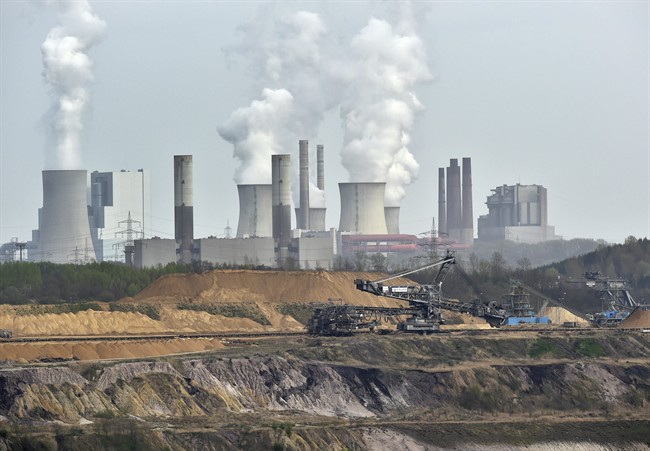If humans continue on living as they do now, Earth’s temperature will warm by a devastating 5 C by 2100, new research has found, resulting in a world of drought, flooding, ravaged food supply, and disappearing species.

Scientists examined the Earth’s history, going back 800,000 years, to project what’s in its future. The Earth, right now, is hot; Not the hottest it’s ever been, but it’s up there.
READ MORE: 2016 will be the hottest year on record
Researchers found that when the Earth is warm, the climate is more sensitive — and susceptible — to atmospheric CO2.
“Currently, Earth is in a warm phase — a so-called interglacial period — and human-induced greenhouse gas emissions interfere with Earth’s energy balance,” said co-author Tobias Friedrich, in an email to Global News.
“So it is very likely that Earth’s larger sensitivity to this interference will lead to a stronger warming than previously thought.”

That means climate change could accelerate at a faster pace than expected and would be at risk of pushing past the “temperature envelope” (the comfortable, livable environment suitable for Earth’s inhabitants) that has prevailed for 800,000 years.
READ MORE: NASA releases video of melting polar ice caps
“For our warming projection, we used a business-as-usual scenario for future greenhouse gas concentrations,” said Friedrich. “Our study projects a warming of about 5.9 C above pre-industrial levels, or in other words another 5 C above present-day temperatures.”
“It is our decision whether we make this scenario our future or not.”
What happens if the Earth’s temperature increases by 5 degrees Celsius
Climate experts agree an increase of 5 degrees Celsius would be devastating.
“The projected effects of greenhouse gas emissions such as sea-level rise, ice melt, coral bleaching, ocean acidification etc. could be devastating not only for our environment but also for our food supply, our economy, and the livelihood of our planet in general,” Friedrich said.
Different areas would see different results from the heat, said Guillaume Mauger, a climate scientist with the University of Washington.
“Impacts can vary from sea level rise, to heat stress, to changes in water availability.”
- 2021 heat dome fuelled by climate change, intensified wildfire risk: study
- B.C. introduces legislation recognizing Haida Gwaii Indigenous title
- Whale experts confident B.C. orca calf will survive, find family if rescue plan succeeds
- Plastic production cap still contentious as Ottawa set to host treaty talks
READ MORE: ‘We’re at risk of losing a lot of species’: The race to save Canada’s wildlife
A 5 C warmer global average would result in Canada warming up between 8 – 10 C, predicts Edward A. Parson, faculty co-director at UCLA’s Emmett Center on Climate Change and the Environment.
“It’s a rough rule of thumb, a mid-to-high latitude, big continental area like Canada, it warms one-and-a-half to two times as much as the global average,” Parson said.

While that might sound like a welcome reprieve from Canada’s often-frosty temperatures, Parson predicts the rise has potential to lead to catastrophe.
Drought will strike in some areas and floods in others. Ecosystems will be destroyed, as will the species that can’t move or adapt. Tropical storms will strengthen and the number of tornadoes could increase. The impacts could be felt across the board.
“It’s likely to be a big, big mess.”
Projection based on ‘pessimistic’ scenario
While the premise of the paper is well established, the variables involved could change the outcome, said Mauger.
“This projection is at the high end of the range of warming projected for the most pessimistic greenhouse gas scenario,” said Mauger.
He said there are two “principal challenges” to this type of analyses. They both boil down to using climate data examples from tens and hundred of thousands of years ago, which modern science simply can’t pinpoint.
READ MORE: Climate change to double area burned by forest fires each year: Report

“There are major uncertainties in paleoclimate data, which could bias the results,” said Mauger. “And there are factors other than greenhouse gas concentrations that affected past climates.”
The study also doesn’t factor in the work underway to reduce emissions moving forward, he added.

Even if the predictions are extreme, they’re by no means outrageous, said Parson.
“This paper is a small increase in alarm about future climate change relative to a situation where there’s already plenty of grounds for alarm,” Parson said.
The solution
World leaders gathered this week in Morocco for a global climate change summit, following the landmark signing of the Paris agreement. The goal is to contain climate change below 2 degrees Celsius of warming by moving away from fossil fuel use.
READ MORE: What’s next for the Paris climate agreement now that it’s ahead of schedule?
The Trudeau government has announced a carbon tax and said there are more sweeping measures to come. Ottawa has also committed $2.6 billion over five years to help developing countries tackle climate change.
The Paris agreement is a good start, Parson said, but it’s not strong enough to achieve even its own goal.
“It will take a lot more to get down to the Paris target of 2 C. This paper, if true, made that more than a little harder.”
READ MORE: Donald Trump’s win doesn’t change Canada’s carbon pricing plan: Trudeau
You can read the full research article, Nonlinear climate sensitivity and its implications for future greenhouse warming, published in the journal Science Advances here.


Comments